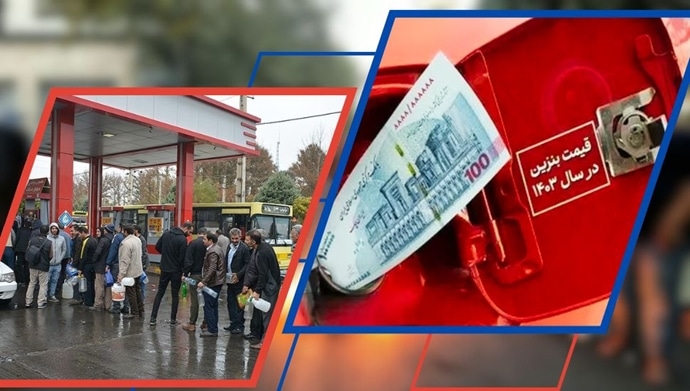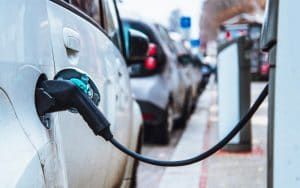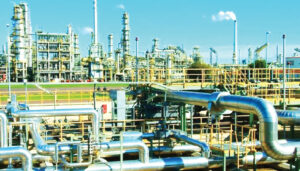The rise in gasoline prices in the corrupt and rent-seeking regime ruling Iran, as one of the sensitive and controversial economic decisions, exposes various aspects of the inefficiency of the regime’s economic and political management. The groundwork for the increase in gasoline prices is part of the regime’s strategy to extort money from the people. This policy, advertised under the deceitful and pompous title of “economic reforms,” reflects deeper structural crises in Iran’s economy.
This issue has undergone numerous back-and-forth discussions. Finally, after prolonged debates and contradictory statements regarding the price hike, Fatemeh Mohajerani, the spokesperson for Masoud Pezeshkian’s government, stated, “To address the gasoline imbalance, we have two strategies: imports and price increases. What is certain is that increasing gasoline prices is not on the government’s agenda” (Source: Asre Khodro website, December 10).
However, based on experience, this tactical retreat and apparent concession cannot be trusted. On November 26, Pezeshkian had laid the groundwork for increasing gasoline prices, stating in a matter-of-fact manner that there is no logic in the government buying gasoline at free-market dollar rates and selling it at subsidized prices. He even criticized the public for not opposing this policy.
It is noteworthy that while he generously funds the regime’s war-mongering activities with astronomical budgets, when it comes to basic needs of the people, he claims, “I don’t have money for wheat, I don’t have money for medicine, I don’t have money for agricultural inputs, and I don’t have money for retirees’ salaries.”
We should note that during a December 2, 2024, interview sarcastically labeled as a “debate” by a state-affiliated newspaper, he once again lamented that he lacked funds for retirees and wheat farmers and could not pay personnel salaries. The implication of these statements is that the regime intends to once again dip into the pockets of the people to compensate for its budget deficit through gasoline prices.
Reasons for the increase in the price of gasoline
1- The economic imbalance crisis
The leaders of the regime, including Pezeshkian, have repeatedly pointed out deep imbalances in various sectors such as energy, water, electricity, environment, and financial resources. These imbalances, rooted in systemic corruption and the lack of preventive policies, have reached levels that, according to state media and officials, could lead the country into irreversible crises if not resolved.
During his interview with state television on December 2, Pezeshkian said, “We are facing very serious imbalances in gas, electricity, energy, water, money, and the environment. All of them are at a level that could lead to a crisis. If we don’t solve these imbalances, we will reach a point where nothing can be done anymore.”
2- Extravagant spending of foreign exchange resources and reduced gasoline imports
The Majlis (parliament) has announced that no budget will be allocated for gasoline imports in 2025. This decision raises the question: What will the budget be spent on instead?
On December 4, Arman-e Melli newspaper quoted economist Mahmoud Jamsaz as saying, “Budget imbalances, caused by additional costs imposed on the government, are at the root of all economic challenges. For instance, institutions like state media and numerous religious and propaganda organizations, which are not related to the government and have no share in the GDP, consume a huge portion of the budget. This budget comes from collected taxes, creating injustices in this area.”
3- Elimination of energy subsidies, especially in gasoline
Energy subsidies, particularly for gasoline, consume a significant portion of the public budget. The government hopes to free up financial resources for budget deficit compensation by eliminating subsidies. However, in the absence of appropriate social and economic planning, this policy will predominantly harm the lower classes of society.
4- Fuel smuggling and the role of regime-affiliated mafias in its continuation
The low gasoline price in Iran has made smuggling to neighboring countries attractive. While officials cite this as one of the main reasons for price increases, the reality is that the root of fuel smuggling lies in the mafias affiliated with the regime Supreme Leader Ali Khamenei’s office, systemic corruption, and the involvement of regime institutions in perpetuating this smuggling.
Contradictions in the regime’s statements
The regime’s senior officials, including Khamenei, often attempt to cover up their inefficiency and bankruptcy with excuses such as “enemy pressure.” For instance, Pezeshkian has admitted that the 40% inflation rate over the past five years is “disastrous,” yet simultaneously emphasizes external factors. Such deflections and contradictions bring no bread to the empty tables of the Iranian people.
The connection between gasoline price hikes and the budget deficit
Due to limited revenue sources, the regime has turned to increasing the prices of energy carriers such as gasoline as a quick solution to address the budget deficit. For instance, the 2025 budget faces a significant deficit estimated between 8.5 quadrillion to 18 quadrillion rials. This gap is primarily due to reduced oil revenues, sanctions, and weak economic management.
Gasoline price hikes are considered for two main reasons:
Gasoline price hikes: Playing with fire
While the policy of increasing gasoline prices might serve as a short-term source of budget funding, it has profound social and economic consequences:
– Increased inflation: Gasoline price hikes typically raise transportation and production costs, fueling a new wave of inflation.
– Reduced purchasing power: Vulnerable groups bear the brunt of gasoline price increases.
– Social protests: Gasoline price increases act as a catalyst for social upheaval. A notable example is the November 2019 uprising, which shook the regime to its core.
Now, if Pezeshkian plans to once again dip into the people’s pockets to cover the budget deficit and fund repression and warmongering, thereby triggering another eruption of the impoverished masses’ fury, no one will be surprised. The stage is set.



